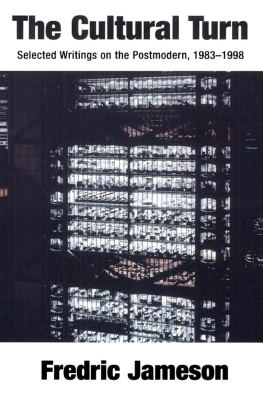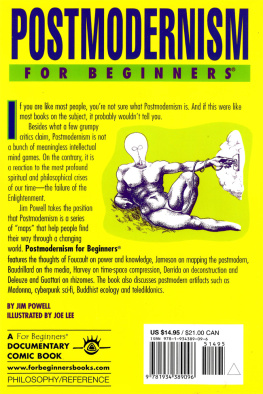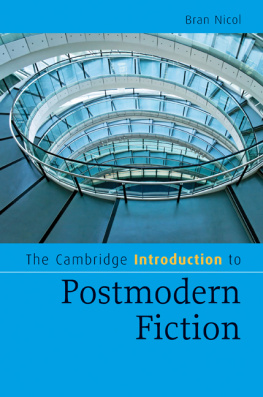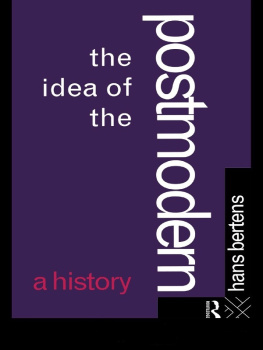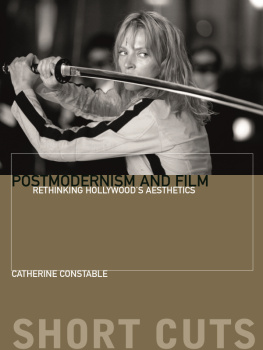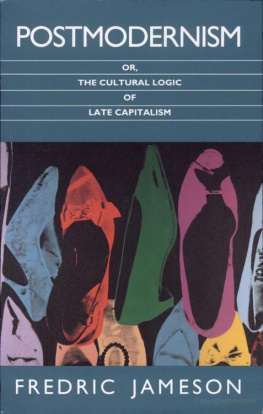First published 2016
by Routledge
711 Third Avenue, New York, NY 10017
and by Routledge
2 Park Square, Milton Park, Abingdon, Oxon OX14 4RN
Routledge is an imprint of the Taylor & Francis Group, an informa business
2016 Taylor & Francis
The right of Pansy Duncan to be identified as author of this work has been asserted by her in accordance with sections 77 and 78 of the Copyright, Designs and Patents Act 1988.
All rights reserved. No part of this book may be reprinted or reproduced or utilised in any form or by any electronic, mechanical, or other means, now known or hereafter invented, including photocopying and recording, or in any information storage or retrieval system, without permission in writing from the publishers.
Trademark notice: Product or corporate names may be trademarks or registered trademarks, and are used only for identification and explanation without intent to infringe.
Library of Congress Cataloging-in-Publication Data
Duncan, Pansy.
The emotional life of postmodern film: affect theorys other / by Pansy Duncan.
pages cm. (Routledge research in cultural and media studies; 81)
Includes bibliographical references and index.
1. Emotions in motion pictures. 2. PostmodernismSocial aspects.
I. Title.
PN1995.9.E46D88 2015
791.43'653dc23 2015028273
ISBN: 978-1-138-95506-6 (hbk)
ISBN: 978-1-315-66661-7 (ebk)
Typeset in Sabon
by codeMantra
Acknowledgments
That the niggly, irksome emotions I write about in this book are not among the cluster emotions I associate with writing it is testament to the grace of the many people who have helped usher it through to publication. Annamarie Jagose was there from the first, and her theoretical and editorial interventions leave their mark on every sentence of this book that manages to communicate some kind of sense. It is a pleasure to be beholden to a figure who continues to set for me an example of a life that seamlessly weds passionate engagement to professional commitment. Colleagues at the University of Auckland, especially Misha Kavka, Eluned Summers-Bremner and Katherine Sender, as well as those farther afield, like Lee Wallace, Sianne Ngai and Meaghan Morris, have been generous in ways that far exceed the bounds of any professional obligation. Their readiness to respond gracefully and efficiently to calls on their time, even when panicky, last-minute or ill-advised, impresses me the more I come to understand the many other obligations that besiege the work-life of senior academics. More recently, my colleagues at Massey Universityespecially Erin Mercer, Rand Hazou and Jeremi Szaniawskihave made my workplace far more fun than any salaried position should be allowed to be. As Head of School, Joe Grixti has been a model of professional support and personal sweetness. I will always be grateful to Frances and Bill van Dammen for the tolerance they showed in welcoming into their family someone whose prospects, both professional and culinary, must often have seemed less than promisingand grateful, too, for raising a son, Tim, whose love I will always be happily unworthy of. Finally, I could not have begunlet alone completedthis book without the support of my parents, Robyn Hawkesby and Grant Duncan. Their unwavering and often unjustified faith in the value of doctoral study, despite the prolonged financial infantilism it has entailed, has been galvanizing in every possible way. This book is dedicated to them.
An earlier version of . I am grateful to the editors of both these journals for permission to republish that material here.
I
Emotion and Postmodernism: is it possible to imagine an odder couple, stranger bedfellows, less bad company? Whereas emotion rolls readily off the critical tongue, postmodernism sticks stubbornly in the critical throatand we dont have to look far to account for the two terms strikingly different scholarly receptions. For if it is now a matter of record that the past two decades have witnessed an explosion of scholarship on affect and emotion still widely dubbed the affective turn, it is equally a matter of record that the turn toward affect and emotion is a turn away from postmodern aesthetics and theory.1 Ann Pellegrini and Jasbir Puars 2009 survey of the resurgence of critical interest in the cultural politics and claims of affect is only one example of what now seems a ubiquitous if unspoken critical imperative: that the celebration of new work on emotion and affect go hand in hand with the denunciation of an older postmodern critical and aesthetic apparatus.2 Blithely taking Fredric Jamesons now-notorious adage about a postmodern waning of affect as an index of postmodernisms hostility to emotional and affective analysis, Pellegrini and Puar no less blithely take the growing centrality of theories of affect as a sign that postmodernism has had its critical and cultural day.3 As they put it, some thirty years after Jamesons first exploration of these questions [of feeling], it is postmodernism that has ceased to be sounded as a term of, and for, critical analysis.4 The writers are quick, of course, to note that Jamesons proclamations about the waning of affect in postmodernism are matched by a series of seemingly contradictory proclamations about the simultaneous emergence of free-floating, non-cognitive entities he calls intensities.5 Despite the interpretative nuance this might be expected to introduce, however, Pellegrini and Puar persist in representing the rise of theories of affect and emotion as a straightforward impeachment both of Jameson himself and of the chronologically dated and critically moribund postmodernism that he has come to represent.
Pellegrini and Puar are not alone in insisting that where the critical stocks of affect and emotion are on the ascendant, those of postmodern theory and aesthetics must be on the wane. In her 1994 contribution to a cluster of work not yet formalized enough to be called a corpus, Kathleen Woodward argued that the excitement of recent research on the emotions lay in the extent to which it has not been underwritten by major theoretical developments such as Foucauldian genealogy or Derridean deconstruction, developments often annexed to the postmodern turn in criticism.6 Eight years later, by the time Brian Massumi released his watershed Parables for the Virtual , this argument was so well established that it could be compressed into a casual, dismissive dig: Fredric Jameson notwithstanding, belief has waned for many, but not affect. If anything, our condition is characterized by a surfeit of it.7 And by 2014, the opening gambit of Eugenie Brinkemas The Forms of the Affects Must one even begin an argument anymore by refuting Fredric Jamesons infamous description of the waning of affect in postmodernity?suggests that what was once a critical claim has hardened into critical clich.8 Yet even if one were to overlook what theorists of feeling have to say about postmodern theory, it would be harder to overlook what they fail to sayto discount, that is, the conspicuous absence of postmodern concepts from contemporary accounts of emotion. While the forms of economic, social and cultural speculation associated with postmodern thinking could conceivably supply a valuable conceptual scaffold for theories of affect and emotion, postmodernism is almost never explicitly invoked or deployed in these analyses.9 Though the hard critical times on which the term postmodernism has fallen across the academy cannot be imputed exclusively to its perceived lack of fit with the affective turn, it is surely no accident that the promotion of affect and emotion to the status of critical buzzwords coincides with the demotion of postmodernism to the status of critical pariah, and its subsequent displacement as a figure for the roughly contemporary by terms such as globalization, hypermodernity, metamodernism, or evenas if out of a desire to efface the very memory of postmodern theorya suddenly sprightly, undead modernity.10 Lacking both the vintage patina of the genuinely historical and the glossy luster of the bracingly current, too recent to be wholly forgotten but too old to be fully respectable, the term postmodernism has simply dropped off the critical docket altogether.


